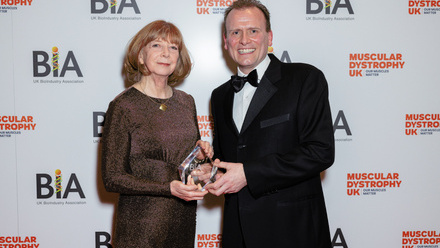CEO Update - 3 February 2025
The UK has all the ingredients to replicate the success of Silicon Valley or the Boston Cluster… I look forward to working with local leaders to fulfil the Oxford-Cambridge corridor’s potential by building on its existing strengths in academia, life sciences, semiconductors, AI and green technology amongst others. Together we will build the infrastructure and partnerships needed to join up this region’s academia, investors and business so that we can boost growth, deliver innovations, and create new jobs that improve all our lives.
With Oxford and Cambridge world-leading in drug discovery, advanced manufacturing and scientific innovation, this initiative has the potential to supercharge the UK’s biotech industry, attracting further investment, creating high-skilled jobs, and reinforcing our global leadership in life sciences.
Celebrating success at our annual Gala Dinner
Our annual Gala Dinner at the Camden Roundhouse last Thursday was a huge success, with many vital connections made and a great time had by all. Our flagship annual event was a testament to the strength and vitality of our sector and confirmed the BIA’s central role within the UK’s life sciences ecosystem. Lord Vallance, Minister of State for Science, Research and Innovation, confirmed this in his speech, saying: “The BIA are really listened to by Government and Number 10.”
It also allowed us to get to know and fundraise for our charity partner of the year, Blood Cancer UK, which we did by raising £50,000 enabling a new cancer clinical trials nurse to be able to operate for a year.

Many Congratulations to Kevin Lee, CEO of Bicycle Therapeutics, who won our Entrepreneur of the Year award on the night.

Last week also saw a wide range of positive developments across the sector
1. A major milestone for mRNA manufacturing capability at the Moderna Innovation and Technology Centre
Last Tuesday, I had the privilege of joining leaders from government, industry and healthcare to celebrate a major milestone for UK life sciences—the completion of construction at the Moderna Innovation and Technology Centre (MITC) at Harwell. The facility plans to produce vaccines this year for UK patients and has significant capacity, transforming the UK’s mRNA vaccine manufacturing capability.
2. Building London’s TechBio future through collaboration and innovation
It was a pleasure to join The London TechBio Revolution at Regent’s Place and take part in the panel Building Community: The London Revolution – Beyond TechBio: Making a Local and Global Impact. The event, co-hosted by Relation Therapeutics and British Land, reinforced the incredible momentum behind London’s TechBio ecosystem. Hearing insights from industry leaders like David Roblin on Pharma-TechBio partnerships and Luke Timmerman’s global perspective, underscored the importance of bold ambition. The new Crick-supported lab space at Regent’s Place shows how physical and strategic foundations are strong for London’s future as an innovation hub. The energy in the room made clear that London is a world-leading destination for TechBio, and I look forward to building on this momentum.
3. Landmark agreement secures access to groundbreaking sickle cell treatment in England
Exciting Access news for the UK’s sickle cell community. Vertex has reached an agreement with NHS England and NICE to provide access to Casgevy, its groundbreaking CRISPR/Cas9 gene-editing therapy product manufactured by Roslin Cells in Scotland, for eligible sickle cell disease patients in England. This access will be facilitated through the Innovative Medicines Fund, following a similar pathway to the agreement for transfusion-dependent thalassaemia patients last August.
This milestone is particularly significant given the challenges the sickle cell community has faced in accessing new treatment options. The complex process included the MHRA making history as the first regulator globally to approve a CRISPR-based technology in November 2023, as well as three NICE Committees throughout 2024.
Accelerating patient access: the refreshed ILAP strengthens the UK life sciences ecosystem
Last week marked the launch of the refreshed UK-wide Innovative Licensing and Access Pathway (ILAP), a development which we hope will support faster access to the most innovative new medicines for patients in the NHS. The BIA has engaged closely with the MHRA and other system partners on the plans to relaunch ILAP, helping to identify learnings from our members’ experience of ILAP to date. The refreshed ILAP now includes the NHS as a full partner, alongside the MHRA and health technology assessment bodies, and aims to be the world’s first fully integrated end-to-end access pathway. The updated pathway also introduces more tailored support for developers, and clearer, more predictable timelines. The eligibility criteria for ILAP have been revised, including limiting applications to medicines that have not yet entered their confirmatory trial. The BIA will continue to work closely with ILAP partners to support the success of the refreshed pathway, which opens to new applications in March 2025.
AstraZeneca pulls £450m Speke modernisation
It was extremely disappointing to see that AstraZeneca have pulled plans to modernize their UK vaccine manufacturing plant on Speke. AZ said in a statement on Friday that “Following protracted discussions
with the government, we are no longer pursuing our planned investment at Speke.
Several factors have influenced this decision including the timing and reduction of the final offer compared to the previous government’s proposal.”
The Speke site will continue to produce and supply flu vaccine, for patients in the UK and around the world. A government spokesperson said a "change in the make-up of the investment" proposed by AstraZeneca had "led to a reduced government grant offer being put forward" adding "all government grant funding has to demonstrate value for the taxpayer and unfortunately, despite extensive work from government officials, it has not been possible to achieve a solution.”
It is clearly not good for our sector if discussions between the UK government and our largest pharmaceutical company (and BIA member) go on for months and months to an unsuccessful conclusion. Former BIA Chairman Clive Dix made clear his frustration on the BBC Today programme on Saturday (interview at 1.42 minutes into the show).
However, the investment into our sector last year of £3.5 billion into UK biotech shows the heft and range of investment into our smaller companies – whilst vaccine manufacture in the UK is delivered by a range of companies including GSK, Valneva and Moderna alongside AZ. The UK has a thriving life sciences sector, worth £108 billion to the economy and providing over 300,000 highly skilled jobs across the country as Patrick Vallance’s visit to Astex demonstrated."







